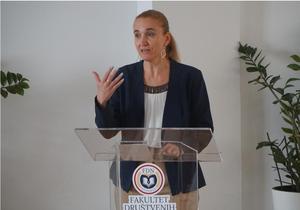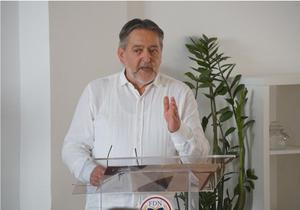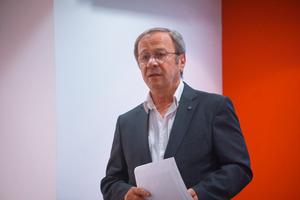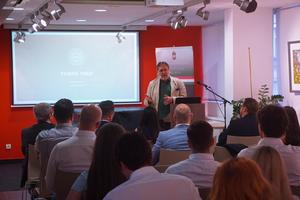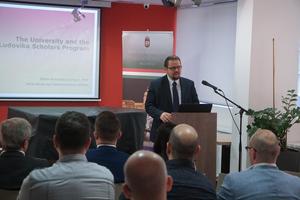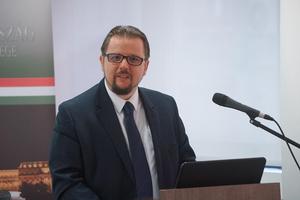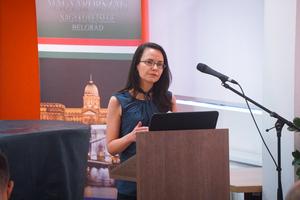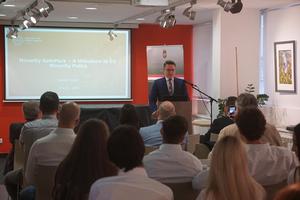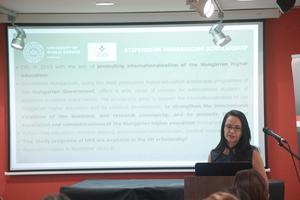While Hungarian state leaders held high-level diplomatic talks with their Serbian counterparts in Palic, a delegation from the University of Public Service visited Belgrade to deepen the cooperation with the young Faculty of Social Sciences (Fakultet Društvenih Nauka) of the University of Economics in Novi Sad.
The contacts with the Belgrade institution were the result of the Ludovika Scholars Program, launched by Rector Gergely Deli and managed by Director Iván Gyurcsík: FDN Professor Slobodan Pajović initiated the institutional collaboration after winning the scholarship, which resulted in the launch of a joint research project focusing on the challenges and opportunities of Latin America and a special issue on Hungarian questions of the Belgrade-based journal Social Horizons (Društveni Horizonti). The event took place at the Hungarian Cultural Centre in Belgrade, in the Collegium Hungaricum conference hall, where the Director of the Centre, Klára Szentgyörgyi, welcomed the audience, followed by the Dean of the Faculty of Social Sciences in Belgrade, Professor Mirko Miletić, who praised the cooperation. In his introduction, he pointed out that the Faculty now has more than 500 students studying in seven disciplines at all levels. The development and strengthening of international scientific cooperation, one of the fruits of which is the close relationship with Ludovika, is therefore of particular importance. Afterwards, Péter Krisztián Zachar, Vice-Dean for International Affairs of the Faculty of Public Governance and International Studies, said that Serbia is of particular importance for Hungary, the Hungarian government and Hungarian higher education, not only as a strategic partner, but also as a gateway to the Western Balkans. By engaging with the Western Balkans, Hungary wants to contribute to regional stability and prevent new conflicts and security challenges. Education and knowledge transfer also have a prominent role to play in this, and the University of Public Service can be one of the key multipliers in Hungary to make these common interests a reality in the future and further strengthen the relationship between the two countries. As one of the most important universities in Hungary and an indispensable source of supply for governmental institutions, Ludovika-UPS is doing its utmost to develop and improve Hungarian-Serbian relations.
Éva Dudás from the International Office presented the educational opportunities offered by the NKE, the scholarships that can be applied for by Serbian students, and the Ludovika Scholars Program. Professor Slobodan Pajović himself spoke about his experiences in Budapest, praising the infrastructure of Ludovika, the organisation of the programme and the opportunity to meet and exchange ideas with other Central European experts.
The event also saw the launch of the latest issue of Social Horizons journal dedicated to Hungary, with guest editors Endre Orbán and Péter Krisztián Zachar. The issue features a total of 8 papers grouped around two major themes. On the one hand, Hungary as a Member State is presented by analysing the European context, and on the other hand, Hungary as a nation-state is the focus of the issue by exploring current internal dilemmas. Péter Tálas' study examines the security policy shocks and responses in the countries and societies of the Central and Eastern European region, and how these shocks and responses have changed the relationship between the countries of Central and Eastern Europe and the European Union since 2008. The EU's joint actions are at the heart of Réka Varga and Blanka Újvári's study, which highlights the EU's diplomatic and legal efforts in response to the Russian-Ukrainian armed conflict. The current security challenges have also created a new context for cross-border cooperation, and Zsuzsanna Fejes' study focuses on the importance of these areas in the EU's cohesion policy and in the development of the neighbourhood policy. Finally, Balázs Tárnok concludes the first part of the journal by focusing on the issue of Hungarian minorities in Europe and examines the Minority SafePack, a European citizens' initiative launched in 2013, which called for the adoption of a series of legal acts to improve the protection of persons belonging to national and linguistic minorities and to strengthen cultural and linguistic diversity in the EU. In the second part of the journal, the authors present some Hungarian policy issues of international importance. Accordingly, Ádám Marton examines the labour market and demographic situation wich is also of interest for the Balkan countries, highlighting not only how developments in Hungary relate to international trends, but also country-specific factors such as the increase in fertility rates in recent years and the achievements of Industry 4.0. In line with the security focus of the first part of the journal, Tamás Csiki Varga examines the modernisation of the Hungarian Defence Forces that began in the mid-2010s. The study explores, explains and evaluates the internal drivers of the modernisation of the defence sector by examining the initiatives of the Zrínyi Program. In their study, Tamás Pálvölgyi and Lajos Kovács analyse the evolution of Hungarian policy on climate change and energy challenges, highlighting that preparing for and adapting to the impacts of climate change is essentially a matter for local communities. The last paper in the journal, authored by Norbert Kis, reflects on the reform of Hungarian higher education, in particular on the new ownership structures and their international models, and on the measurability dimensions of university autonomy.
The current issue of Social Horizons is available here.
During the event Balázs Tárnok, one of the authors, gave a presentation on his study, which can be seen as a positive element of Serbian-Hungarian relations, as both sides are dealing with the issue of national minorities in an innovative and very proactive way. In his presentation, Balázs Tárnok examined the Minority SafePack, a European Citizens' Initiative launched in 2013, focusing on the issue of Hungarian minorities in Europe. He presented not only the legal framework and the political perspectives of the different EU institutions on the protection of national minorities at EU level, but also the Europe-wide signature collection of the Minority SafePack and the European Commission's negative decision. In the EU, 40-50 million people belong to a national minority, without this diversity Europe would not be nearly as rich as it is. He underlined that respect for the rights of persons belonging to minorities is a fundamental value of the EU, but in practice the EU institutions do not have a significant impact on their preservation and regulation, as the current Community legal framework lacks concrete and enforceable provisions for the protection of national minorities.
On the second day of the visit, the successful cooperation continued on the campus of the Faculty of Belgrade, where the participants discussed the possibilities of joint Hungarian-Serbian socio-economic diplomacy in Latin America in a joint workshop. The event was chaired by Slobodan Pajović and Mónika Szente-Varga and featured an online presentation by Professor Juan Agullo from Brazil, as well as a presentation by Edita Stojić Karanović, founding President of the International Scientific Forum "Danube - River of Cooperation". In her presentation, Mónika Szente-Varga pointed out that the two countries have a unique opportunity, as Serbian and Hungarian interests and opinions coincide in many areas. Especially in the Latin American region, there is an opportunity for Serbia and Hungary to join forces, for example, by sharing the space of existing embassy buildings, which is cost-effective and at the same time offers greater international visibility. Taking advantage of Serbia's and Hungary's diplomatic experience from previous eras, focusing on culture, using the heritage of sport, music, and famous personalities from the region, could open Latin-America to the joint aspirations of the two countries.
As a result of the two-day visit, the parties agreed to further deepen cooperation, to develop opportunities for mutual exchanges of professors and students, to continue the joint research that has been initiated and, building on this, to initiate further joint publications.
Text by International Division, FPGIS
Photos by Milana Pavković/Srbija Danas
